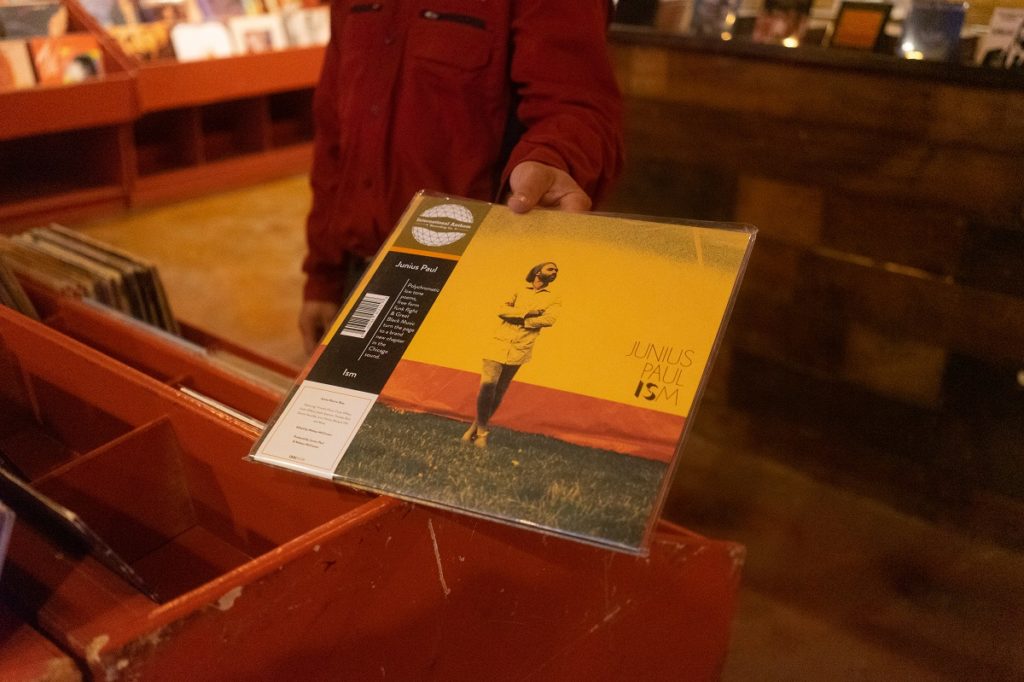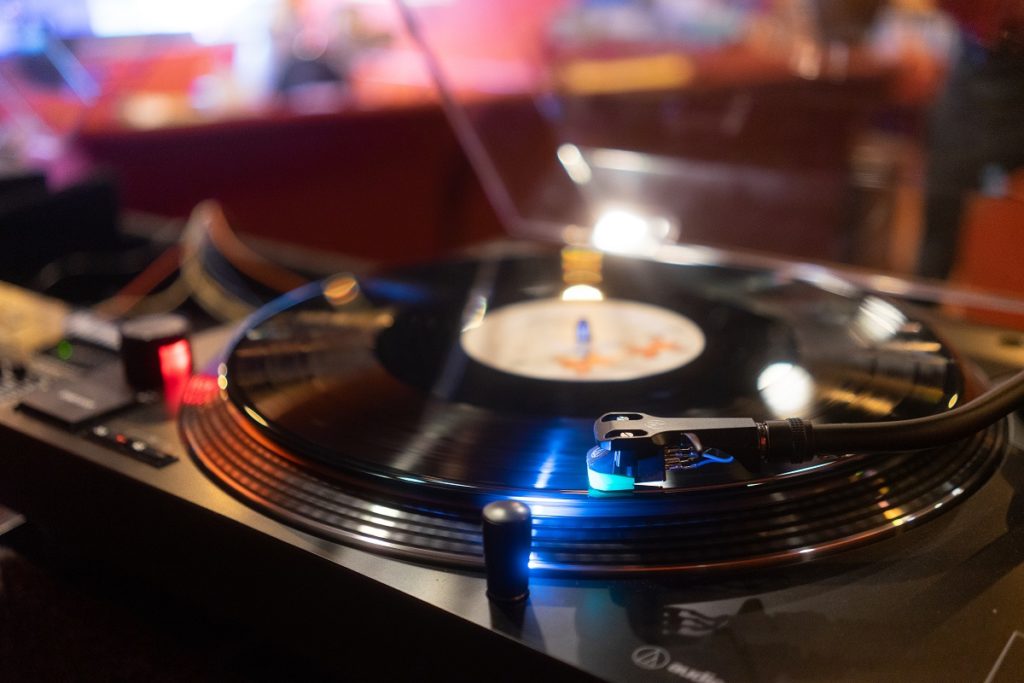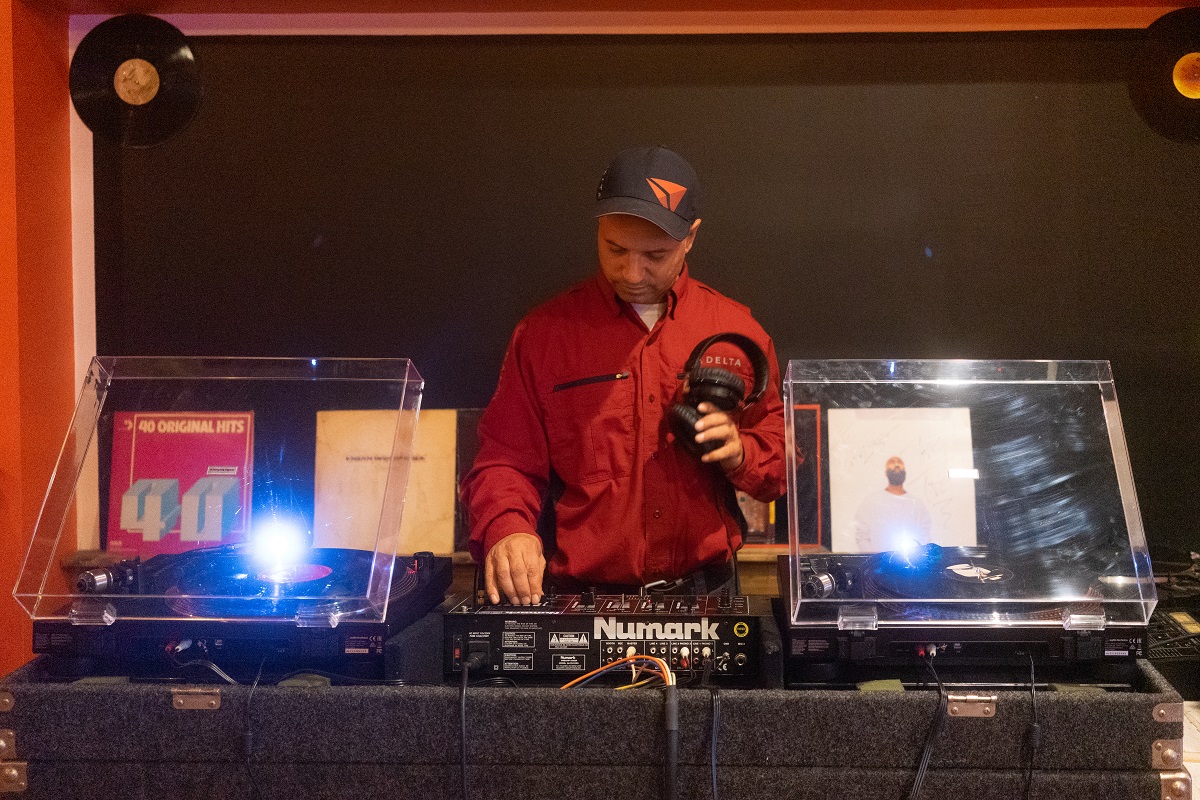Kevin Beauchamp, the owner of Katalyst Coffee Lounge and Music Gallery, is an avid music fan and record collector. “It might be the old-school nature I come from,” he says. “I’m used to pressing up some CDs and hustling to sell ‘em … something about that, physically holding the music, it connects with the experience.”
He’s a veteran of Chicago’s house music scene, having spent countless hours DJing around the city during high school. This experience inspired Beauchamp to pursue his love of music, and led to a career working for record companies on the West Coast. Eventually, Beauchamp left PolyGram to start his own label, Katalyst Entertainment, which has published releases by Chicago icons like Kahil El’Zabar, Phil Cohran, and the Art Ensemble of Chicago.
Today, Beauchamp runs his café and record store in Hegewisch on the Southeast Side. Now in his early fifties, Mr. Beauchamp wants to share his records and stories with the world through his store.
This interview has been edited for length and clarity.
Why do you think there’s been such a resurgence in demand for analog music mediums, like vinyl and cassettes?
It’s just a warmer, more human feel, I guess. You know, I’m a physical person. I think that music is a tool, you know, or a resource, a raw material for social interaction from person to person. And I think that’s where it lives most effectively.
You know, I really want young people to get into having some physical interaction, man. I know with the pandemic, all that isolation is an effort to limit the spread [of COVID-19], but I think that we gotta keep our humanity somewhere. So you know, virtual is all fine and dandy, but I don’t think that’s really living, you know.
Why did you decide to name your record store and label Katalyst? Is there any philosophy behind the name?
The idea was about what a catalyst is, right. It’s something that creates a change without changing itself, you know, a spark. It was about building something here in Chicago, music industry-wise. Because in the past labels were plucking talent out of Chicago.
Before you started working on the Katalyst store, what was your history with music, personally and professionally?
I was a DJ in high school, and always had a collection of music. My father was a singer, my stepfather was a blues singer, and my mother was a collector. I always had a lot of music, a lot of records, and a lot of just listening to everything, you know? So when I got into high school, I found that the house music scene was kind of rekindling a lot of old cuts that I had already gravitated to.
Post-high school, I went to college down in Champagne. At that time, my mother moved back to California, so I went out there to study broadcasting. That led me to an internship at A&M records out in LA. So I worked at A&M for a time, and then I got offered a job with PolyGram Records.

Besides being a record store, Katalyst is also your record label. How did that come about? What made you want to work independently?
So I started getting into the music industry, and once I got working for major labels and distribution and all, I was kinda where I wanted to be. I wanted to get into the creative end. I wanted to get into the A&R department.
I had a lot of friends that were into the hip-hop movement in the late eighties, early nineties, so I started producing records with them. And [at the same time], after a few years with PolyGram, I was facing a big wall to get to the creative side. I was ten years younger than the next younger person, and was like: I’m not going to wait around ten years. I was young enough to take some risks. I decided I would leave and start my own label.
What did you do besides working on your label after you left PolyGram?
I don’t know if you know who The Art Ensemble of Chicago is; they’re kind of the flagship group of the avant-garde jazz movement. I grew up with that influence around— I went to a concert of theirs, which captivated me, when I was about eleven or twelve. And later, after I left PolyGram,I had the opportunity to go on the road with them. A couple of months later, I’m over in Europe. At first I was a roadie, but I became their manager and tour manager, all the while producing for my label.
I’ll tell you, the first show we did…just seeing it live, a whole new wing of understanding opened up to me. The first solo Roscoe Mitchell took…I’d seen the rehearsal, and I was like—okay, you know, whatever. But when it was real-time, and it was live, he took off. And then it was like: I get it.
I know you have a long history of working behind the scenes, but what made you want to start a record store here?
I went down to Kansas City for a couple of years. I got hooked up with a contractor who got the contract to redo the jazz district, and I was going to have my store there. However, my children came back to Chicago to be with their mother. So I didn’t like not being close by. I decided to move back to Chicago, and then I started looking for buildings to create this vision I already had established. So I bought the building and have been working on it here and there. I got hooked up with the business association. So finally, I just got to the point where I said: I have to open.

What was your breakout project, or an artist you were incredibly excited to work with?
I met Phil Cohran, and I ended up putting out some recordings, some reissues and unreleased stuff with him. That kind of put my label on the map. I got my distribution deal. After that, people started coming out of the woodwork, wondering how I got to release Phil Cohran’s material. And it was pretty amazing to me as well, because I had gotten a hold of the recording called The Malcolm X Memorial and put that out. Phil Cohran passed on a couple of years ago, but he’s still probably the most under-talked-about influence in Chicago music that you can think of.
As a big fan of records, what’s your opinion on music streaming?
The whole streaming thing, while it’s convenient and the newer generations have adapted to that, I think that the way we consume music affects us, right? Take albums in particular, the way we react to them—not only sonically, there’s a physiological thing that happens [in response] to the wavelengths and stuff like that. Now that’s a little bit deep for me. Phil Cohran could probably explain it! I’ve always been a vinyl person, personally. I mean, I have a lot of CDs too, but when everybody was transferring over, I stuck with my vinyl. I always liked to play my vinyl instead of CDs or tapes.
You’ve mentioned hosting live music at Katalyst and how it builds a communal space for music listing. Do you think your time as a house music DJ plays into that?
Oh yeah, yeah. That’s exactly what comes into play. I mean, it’s an evolution, right? [In the audience] everybody listens to the music and vibes and shares this experience. As a DJ, the same thing happens, except you have a whole ’nother interaction, going on the stage. And that’s like the next level of that same experience, I would say, because it’s more instant. You’re doing something with your selections, picking up on a vibe, to influence whatever the mood is and things like that.
That’s missing—that kind of social structure and social health, in a certain sense. So the idea is for different people to play their choices,their selections, and share them so that we can all have a shared listening experience. I might learn something from the few records you decide to play, or vice versa.
With streaming services, you have access to a vast library of music. But listening to something physical is almost like a ritual, because you have to sit down and maybe even force yourself to get through an album. Would you agree with that?
Yeah, exactly. It’s a ritual, and it requires attention. You’re actively listening, instead of it just being in the background. I think that when you listen to albums, it’s more holistic or more healthy. Physically, I feel that the act of playing records itself is something valuable, in terms of physically holding it. And the artwork is a big thing in some cases.
I couldn’t help but notice—is there almost an archival element to your record store?
There is an archival element to it. Some of these records are from my own collection. I don’t know how old you are, but I’m fifty-one—so I spent a lot of my life acquiring stuff, right. And so, at some point, you get to this point where you ask: what am I going to do with this? So I want to make it available.
So you start selling things, but every time you sell something, it’s like a piece of you. I sold a record the other day, and I was like, “Oh no.” But I had to get out of that mentality, because at the end of the day, none of this shit is anybody’s, and you can’t take it with you.
What’s the future for Katalyst?
I just opened, so you know, I am selling records and still trying to get the coffee piece together. I just ordered a coffee machine. Hopefully, it suffices for now! And then I’ll grow a little in that area. But so far, it’s been a good reaction. People come in, they see the vibe, and it’s still a little bit of a mystery. But it kind of has a life of its own, so we’ll see where it goes.
I’m moving totally on spirit with it, you know? I don’t know how or why, but this is what’s presented itself to me.
Jesús G Flores is a Chicano multimedia journalist from the Far South Side. He mostly covers Latino subcultures.


It sounds like your experience with Phil Cohran, especially in reissuing his recordings, had a profound impact not only on your label but on your perspective regarding music consumption. Cohran’s influence on Chicago’s music scene is indeed underappreciated, but his contributions continue to resonate with those who dig deeper into the city’s musical history.
Regarding streaming, I can sense a deep attachment to the physicality and ritual of listening to vinyl, and I completely agree with your sentiment. Streaming, while convenient and offering access to vast libraries of music, lacks the tactile experience and the sense of intentionality that comes with handling a record or even a CD. When you sit down with a physical album, there’s a kind of engagement that goes beyond just hearing the music—it becomes a deliberate act of listening, often connecting you more deeply with the work.
good